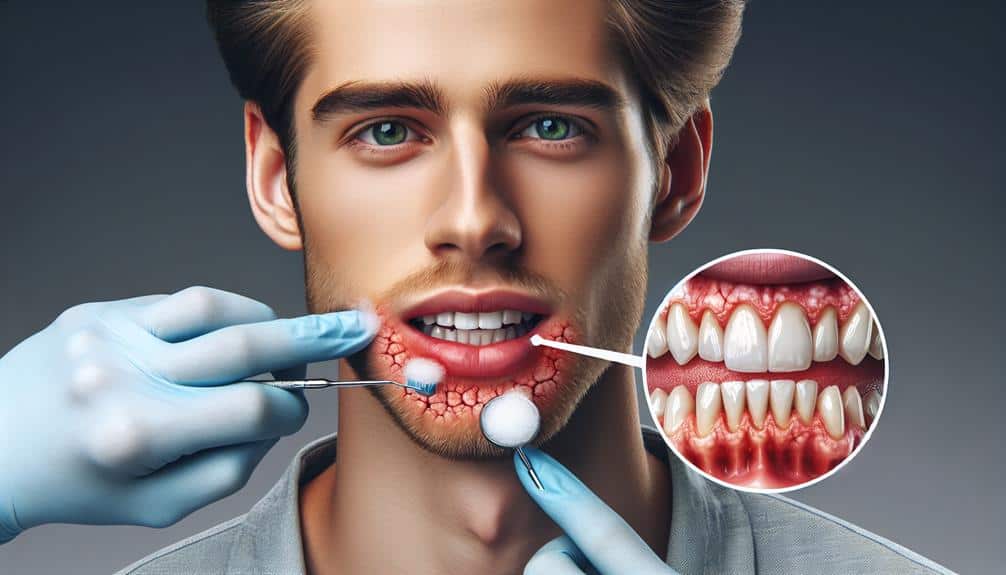Avoid the risks associated with unapproved teeth whitening kits by opting for FDA-approved products, which undergo rigorous testing to guarantee safety and effectiveness. Non-FDA approved kits may contain abrasive ingredients like chlorine dioxide or hydrogen peroxide, leading to enamel erosion and gum irritation. Prolonged use of these unauthorized kits could result in irreversible damage to your tooth enamel, increased sensitivity, and costly dental procedures to restore your teeth. Safeguard your oral health by choosing regulated products that don't pose potential long-term complications.
Key Points
- FDA approval ensures safety and effectiveness of whitening products.
- Harmful chemicals like hydrogen peroxide and chlorine dioxide in unapproved kits.
- Potential irreversible damage to tooth enamel from unregulated products.
- Allergic reactions and skin irritations from unauthorized whitening treatments.
- Long-term health risks like enamel erosion and tooth decay with unapproved kits.
Risks of Using Non-FDA Approved Kits
Using non-FDA approved teeth whitening kits can pose serious risks to your oral health. It's essential for consumers to be aware of the potential risks associated with these products. While the appeal of achieving a brighter smile quickly may be tempting, it's important to contemplate the consequences that may arise from using unregulated kits.
Consumer awareness plays an important role in understanding the risks involved. Non-FDA approved teeth whitening kits may contain abrasive ingredients that can harm the enamel of your teeth, leading to increased tooth sensitivity and potential damage. Additionally, these products may not undergo the same rigorous testing and quality control measures as FDA-approved products, making their safety and effectiveness questionable.
To safeguard your oral health, it's recommended to opt for teeth whitening products that have received FDA approval. By choosing regulated products, you can minimize the potential risks associated with unapproved kits and achieve a whiter smile without compromising your dental health.
Harmful Chemicals in Unapproved Products
Unapproved teeth whitening kits may contain harmful chemicals that can jeopardize your oral health and damage your teeth. When considering the potential risks associated with using these products, it's important to understand the chemical ingredients they might contain:
- Hydrogen Peroxide: Some unapproved kits have higher concentrations of hydrogen peroxide than what's safe for at-home use, leading to gum irritation and tooth sensitivity.
- Chlorine Dioxide: This chemical, found in some unregulated whitening products, can erode the enamel of your teeth, causing long-term damage.
- Carbamide Peroxide: Although commonly used in teeth whitening, unapproved kits may have excessive amounts of carbamide peroxide, resulting in enamel erosion and weakened teeth.
- Acids: Unregulated kits may contain acidic ingredients like citric acid or acetic acid, which can wear down the protective layer of enamel on your teeth, making them more susceptible to decay and sensitivity.
Be cautious of these harmful chemical ingredients in unapproved teeth whitening kits, as they can pose serious risks to your oral health and overall well-being.
Potential Damage to Tooth Enamel
Damage to tooth enamel can result from prolonged exposure to harmful chemicals in unauthorized teeth whitening kits. Enamel erosion, a condition where the enamel wears away, is a significant risk associated with these products. Enamel is the hard outer layer that safeguards your teeth, and once it erodes, it doesn't regenerate. This can lead to increased tooth sensitivity, making hot, cold, or sweet foods and drinks painful to consume.
Enamel erosion can also cause changes in the appearance of your teeth, such as discoloration or translucency, as the underlying dentin becomes more visible. This can compromise the aesthetics of your smile and result in the need for costly restorative dental procedures to repair the damage.
Moreover, the sensitivity risks associated with enamel erosion can impact your daily life, making it uncomfortable to perform simple tasks like brushing your teeth. Safeguarding your enamel is vital for maintaining good oral health, so avoiding unauthorized teeth whitening kits that could harm this protective layer is crucial.
Allergic Reactions and Irritations
Exposure to certain ingredients in unauthorized teeth whitening kits can trigger allergic reactions and irritations in some individuals, highlighting the importance of understanding the potential risks associated with these products.
When using unapproved teeth whitening kits, you may experience skin reactions or other irritations due to the harsh chemicals present. To help you visualize the risks involved, consider the following:
- Imagine waking up to itchy, red patches on your skin after using an unauthorized teeth whitening gel.
- Picture the discomfort of swelling and blistering around your mouth, a possible consequence of an allergic reaction to unregulated whitening strips.
- Visualize the frustration of dealing with a burning sensation on your gums caused by a non-approved whitening pen.
- Envision the inconvenience of having to seek medical attention due to severe skin irritations from an unregulated teeth whitening lamp.
These scenarios underscore the safety concerns and potential skin reactions associated with using unapproved teeth whitening products. It's essential to prioritize your health and seek professional guidance when considering teeth whitening treatments.
Long-Term Health Complications
Potential long-term health implications may arise from the use of unauthorized teeth whitening products, emphasizing the importance of understanding the risks associated with these treatments. While immediate effects like tooth sensitivity and gum irritation are commonly known, the consequences of prolonged use can be more severe. Poorly regulated whitening kits may contain abrasive ingredients that can damage the enamel, leading to long-term oral health issues such as increased tooth sensitivity, enamel erosion, and even tooth decay.
Maintaining good oral hygiene practices is vital to prevent these complications. It's recommended to consult a dental professional before using any teeth whitening products to make sure they're safe and effective. Professional treatment not only guarantees better results but also reduces the risk of adverse effects on oral health in the long run. Regular dental check-ups and cleanings can help monitor any changes in the teeth and address any concerns promptly, ensuring a healthy and bright smile without compromising oral health. Remember, prioritizing safety and seeking professional guidance is essential when it comes to teeth whitening for long-term oral health.
Frequently Asked Questions
Are There Any Legal Consequences for Selling or Using Non-Fda Approved Teeth Whitening Kits?
Selling or using non-FDA approved teeth whitening kits can lead to legal consequences due to regulations on health products. These kits may pose health risks and lack proper oversight. Stay informed and prioritize safety by choosing approved products.
How Can Consumers Identify Harmful Chemicals in Unapproved Teeth Whitening Products?
To identify harmful chemicals in unapproved teeth whitening products, consumers should scrutinize ingredient lists, look for common toxins like chlorine dioxide or high levels of hydrogen peroxide, and prioritize safety over shortcuts for whiter teeth.
Can Using Unapproved Teeth Whitening Kits Lead to Tooth Sensitivity or Pain?
Using unapproved teeth whitening kits can lead to tooth sensitivity or pain. Enamel erosion, gum damage, and tooth discoloration are risks. Be cautious; seek dental advice. Protect your enamel from thinning by choosing safe products.
Are There Any Long-Term Effects on Oral Health From Using Non-Fda Approved Teeth Whitening Products?
Using unapproved teeth whitening products poses health risks and potential long-term effects on oral health. Safety concerns include unknown ingredients and improper concentrations, increasing risks involved. Protect your oral health by choosing FDA-approved products for whitening.
What Should Individuals Do if They Experience an Allergic Reaction or Irritation From Using an Unapproved Teeth Whitening Kit?
When an allergic reaction strikes from using an unapproved teeth whitening kit, prioritize your safety. Cease use immediately. Wash your mouth gently. Seek dental advice promptly for proper treatment and explore approved alternatives to prevent future incidents.




